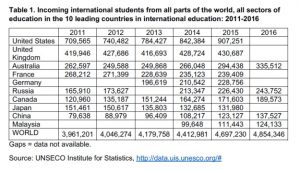Daily Comment (August 8, 2018)
by Bill O’Grady and Thomas Wash
[Posted: 9:30 AM EDT] Today’s trade is becalmed—there is nothing major happening in any markets thus far. This sort of activity is very typical for August. Here is what we are watching today.
Trade news: The U.S. announced that $16 bn of Chinese imports will face an additional 25% tariff.[1] The tariffs are scheduled to take effect on August 23. There was no direct reaction from China.
China: The reason there was no direct response from China may be due to the fact that the leadership of the CPC is holding its annual meetings at the Beidaihe resort.[2] The meetings are usually held annually under strict secrecy. Dubbed an “unofficial retreat,” the attendees, which often include former general secretaries, have an opportunity to meet informally and discuss policy. It has been noted that Chairman Xi hasn’t been seen on the news for a few days, suggesting he may have gone to the resort in the first couple days of August. Xi is expected to meet with Malaysian President Mahathir in mid-August, so the leadership may be on holiday for another week or so.
The KSA vs. Canada: The recent spat between Canada and Saudi Arabia has raised one interesting issue. Western colleges and universities have enjoyed an influx of foreign students. Often, these students are wealthy and are thus a rare breed on many campuses—a student paying the full advertised tuition.[3] Although the data is less than complete, the latest data available shows 900k+ foreign students are in the U.S. out of around 20 mm total. Here is what the top 10 destinations look like:

Saudi Arabia has told its students in Canada that they should plan on leaving and going to school elsewhere.
There are three issues to consider with regard to the KSA’s action. First, universities are designed to permit free and full expression of ideas. That characteristic has been coming under fire from numerous fronts and brought a rather famous response from the University of Chicago.[4] However, if universities, fearful of losing the lucrative foreign student “inflows,” begin to temper their criticism of foreign policy actions by non-democratic nations, the concept of the university itself comes into question. Second, for some colleges and universities, the foreign flows may be the difference between continuing operations and insolvency. The number of colleges and universities in the U.S. is already in decline.[5] Losing foreign students would exacerbate this trend. Finally, foreign students have been a “stealth” way to foster capital flight. Sending “junior” to study in the U.S. and buying a house or condo for him to live in while at school has become a convenient way to build an escape pod in the West. A drop in foreign students could be a negative factor in college town real estate.
Will the concerns of higher education affect foreign policy? It likely depends on the country but it wouldn’t be surprising, especially for smaller nations lacking other levers of influence. The KSA would probably not take these steps with the U.S. as the risks would be too great, but Canada is a different story.
[1] https://ustr.gov/about-us/policy-offices/press-office/press-releases/2018/august/ustr-finalizes-second-tranche?utm_source=POLITICO.EU&utm_campaign=baedfca85a-EMAIL_CAMPAIGN_2018_08_08_04_22&utm_medium=email&utm_term=0_10959edeb5-baedfca85a-190334489
[2]https://www.google.com/maps/place/Beidaihe,+Qinhuangdao,+Hebei,+China/@40.3592483,119.1469383,8.79z/data=!4m5!3m4!1s0x358c7f688af8445d:0x6c3a63022a947804!8m2!3d39.834596!4d119.484522
[3] https://ftalphaville.ft.com/2018/08/07/1533647855000/Saudi-Arabia-vs–Canada–the-education-angle/
[4] https://news.uchicago.edu/sites/default/files/attachments/Dear_Class_of_2020_Students.pdf
[5] https://www.insidehighered.com/news/2017/07/19/number-colleges-and-universities-drops-sharply-amid-economic-turmoil


